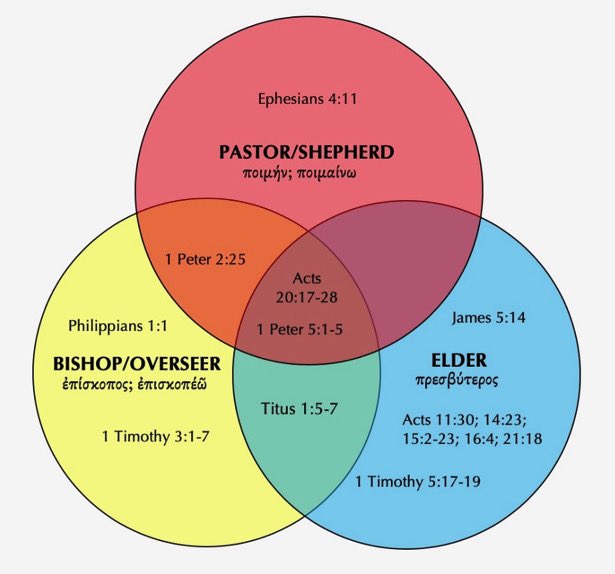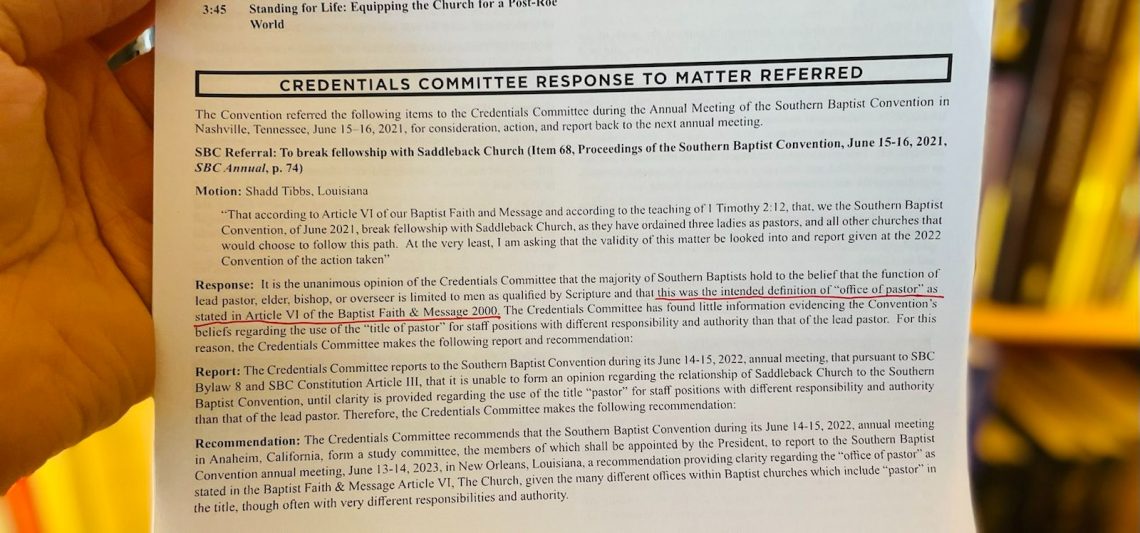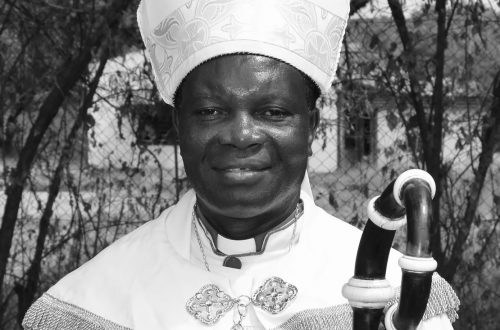An unexpected thing happened this week at the annual meeting of the Southern Baptist Convention (SBC) when Rick Warren, pastor of Saddleback Church, rose to make a statement that began with, “It’s customary for a guy who’s about to be hung to let him say his dying words.” He said it tongue-in-cheek, but we all knew that he was actually referring to something very serious—that his church is currently under scrutiny from the SBC for ordaining three women as pastors just over a year ago. Just recently, Warren also announced that his successors at Saddleback would be a husband and wife team, both of whom will be pastors leading the church.
As many of you readers know, the SBC is a convention of churches with a doctrinal statement that is unequivocal in disallowing female pastors. Our statement of faith, the Baptist Faith & Message (BF&M), says that the church’s
…scriptural officers are pastors and deacons. While both men and women are gifted for service in the church, the office of pastor is limited to men as qualified by Scripture.
In the course of the proceedings, the chair gave Warren the opportunity to make an extended statement to SBC messengers, who would decide whether to remove or retain Saddleback as an SBC church. I won’t get into the weeds of SBC politics here. If you are interested in how the convention dealt with Saddleback, you can read more about it here.
What I wish to do in this essay is to respond substantively to Warren’s statement to the convention. If you haven’t seen it yet, I encourage you to scroll to the bottom of this page and watch it for yourself. Warren begins by saying that he would not defend himself but rather would read a “love letter” of appreciation for the SBC since this was likely his last time to appear as a Southern Baptist. So he didn’t make a sustained case for female pastors in his speech. Nevertheless, he did allude to at least one important line of argument in favor of Saddleback’s position, and it is to that argument that I wish to respond.
Before I do so, let me say that I have no ill will towards Pastor Warren. There is obviously much to be grateful for over the long course of his ministry. I don’t know him personally, but I have friends who do. By all accounts, he is a warm, loving pastor who really loves the Bible and cares about people and the Great Commission. So I don’t write any of this in a spirit of rancor to disparage him. Nevertheless, I do believe that he is greatly mistaken in affirming women as pastors, and I want to explain from the Bible why this is the case.
Pastor as a Gift Not an Office
At the very beginning of his statement, Warren made a comment—almost in passing—describing his view on female pastors:
I have most of you on my mailing list anyway, and I can write to you and tell you what I believe about the gift of pastoring as opposite from the office of pastoring.
Even though Warren didn’t elaborate his view in detail, a number of different writers and theologians have argued for this interpretation of “pastor” in recent years. One of them was my late seminary professor Harold Hoehner, who wrote an important article on this topic back in 2007 titled “Can a Woman Be a Pastor-Teacher?” His answer to that question is an unequivocal “yes,” she indeed can.
Hoehner maintains that Southern Baptists erred in their 1984 resolution on women in ministry because we failed to recognize the biblical distinction between gift and office. Hoehner argues that “Scripture consistently maintains a distinction between the office and the gift. Eldership is an office, whereas pastor-teacher is gift” (p. 763). The office of elder/bishop has specific qualifications, including that the officeholder be a male. The gift of pastoring—because it is not an office—doesn’t have any such qualifications. He writes, “People are not given gifts based on observable qualifications but because of God’s sovereign gracious act” (p. 764). Anyone, therefore, can receive the gift of pastoring including women. So he concludes,
“A woman may have the gift of pastor-teacher or even an apostle (as may have been the case for Junia/Junias in Rom 16:7), but she cannot be an elder” (p. 767).
“By distinguishing between gift and office, it allows a woman to exercise her sovereignly bestowed gift of pastor-teacher without becoming an elder, bishop, or bishop… there would be no problem in ordaining women who have the gift of pastor-teacher for a particular service or ministry, because neither are an office” (p. 768).
“The main thrust of this article is to assert clearly that a woman can be a pastor-teacher because it is a gift and not an office… Therefore, a church may feel free to ordain a woman in recognition of her gift or gifts with a clear understanding that her ordination is not a recognition of office” (p. 771).
I don’t know the degree to which Warren adheres to Hoehner’s exegesis, but this is the basic structure of the argument for those who hold this view. What should we think about the argument?
Invalid Distinction between Gift and Office
This is an interesting argument and has become increasingly common among evangelicals and churches who ordain women as pastors. For Southern Baptists, the problem with the argument is that it denies the historic teaching of the Baptist Faith & Message, and more importantly of the Bible. Let me explain how.
First, the argument depends on a specious, unbiblical distinction between gift and office, especially in Ephesians 4:11:
11 And He gave some as apostles, and some as prophets, and some as evangelists, and some as pastors and teachers, 12 for the equipping of the saints for the work of service, to the building up of the body of Christ (emphasis mine).
According to Hoehner and others who hold this view, the fact that God gives some to be apostles, prophets, etc. means that this list cannot be comprised of offices but of gifts. Also, because these gifts are given without qualifications (as we find in the discussion of the office of elder in 1 Timothy 3:1-7), that is yet another reason to view them as gifts not offices. The problem with this reading is that there is nothing in the text preventing us from seeing these office holders as gifts to the church. In other words, it’s not an either/or but a both/and. Merely observing that God gives these persons to the church is no argument against their being office holders—especially when the terms in the list are identified as offices elsewhere in Scripture.
Second, this argument fails because it assumes that pastor and elder refer to two different things. There is ample scriptural warrant for understanding both of these terms (and one other) as three ways of referring to the same office.1 Consider, for example, the apostle Paul’s words in Titus 1:5-7:
“This is why I left you in Crete, so that you might put what remained into order, and appoint elders in every town as I directed you… For an bishop, as God’s steward, must be above reproach…”
Clearly, “elder” and “bishop” are used interchangeably here. Likewise, in 1 Timothy 5:17, Paul uses the term “elder” where readers would expect him to say “bishop” based on his earlier usage in 1 Timothy 3:1-2. In doing so Paul shows again that “bishop” and “elder” are two ways of referring to the same office.
Paul is not the only New Testament author who speaks this way. Peter exhorts “elders” to “shepherd” the church by “exercising oversight” (1 Pet. 5:1-2). He says that the job of the elder in verse 2 is to “exercise oversight” (episkopeo). It’s the verb form of the term “bishop” (episkopos). Peter also draws in a third concept—shepherd (poimaino), which is the verb form of the noun for “pastor” (poimen, cf. Eph. 4:11). In two verses, Peter draws together three different word-groups in reference to the one office of church leadership—bishop, pastor, and elder.
In another text, Peter applies the terms pastor and bishop to Jesus himself: “For you were straying like sheep, but have now returned to the Shepherd (poimen) and Bishop (episkopos) of your souls.” Notice that even Peter uses “shepherd” and “bishop” interchangeably. Peter is reflecting what is true in all of the New Testament. The authors of scripture use these three terms to refer to the one office.
One other text confirms that these terms are used interchangeably. Consider Luke’s account of Paul’s final meeting with the Ephesian elders in Acts 20:17-38. Luke says that Paul gathers together the “elders,” calls them “bishops,” and exhorts them to “shepherd” the church in Ephesus (Acts 20:17, 28). Thus Luke also has all three word-groups appearing in this one chapter to refer to the one office.
Colin Smothers has created a helpful diagram illustrating the overlapping usage of these three word groups in the New Testament (see below).

The bottom line is that three different biblical authors make use of the pastor/elder/bishop language, and they do so in a way that suggests the terms are interchangeable. We are on firm ground to regard pastor/elder/bishop as three ways of referring to the same office. It is this exegesis that leads Ben Merkle to conclude, “Because pastors and elders/bishops have the same function (i.e., shepherding and teaching), the two terms should be viewed as referring to the same office.”2
For that reason, the Bible does not support the idea that the gift of pastoring is distinct from the office of elder. Indeed, the Bible uses pastor terminology interchangeably with elder terminology.
It is worth noting that this exegesis is not obscure. It is a common interpretation of these texts, especially among those who hold to two scriptural offices in the church.3
What about the BF&M?
Warren’s distinction fails not only biblically, but also in terms of the BF&M. This becomes really clear when you look at the two revisions to our statement of faith since its original publication in 1925. The chart below shows the relevant excerpts from the original BF&M and its two subsequent revisions. All three of them explain what the “scriptural officers” of the church are.
|
BF&M (1925) |
BF&M (1963) |
BF&M (2000) |
|
“Its Scriptural officers are bishops, or elders, and deacons.” |
“Its Scriptural officers are pastors and deacons.” |
“Its scriptural officers are pastors and deacons. While both men and women are gifted for service in the church, the office of pastor is limited to men as qualified by Scripture.” |
Notice that the original 1925 version identifies two offices: bishop/elder and deacon. Notice also that the 1963 edition changes “bishops or elders” to “pastors.” Does this change in wording reflect a change in beliefs among Southern Baptists about the scriptural officers of the church? The answer to that question is clearly “no.” We know this to be the case because the principal author of the 1963 BF&M is the late Herschel Hobbs,4 and Hobbs was clear in his writings about the Baptist Faith and Message that he believed the terms pastor/elder/bishop to be interchangeable in scripture. In his book titled The Baptist Faith and Message, Hobbs writes:
The same office is variously called bishop, elder, or pastor… That these three words refer to the same office is seen in Acts 20:28. These words were spoken to the elders of the church in Ephesus (v. 17). Note “bishops” and “to feed [as a shepherd] the church of God.” Titus 1:5-7 uses “elder” and “bishop” interchangeably. And in Acts 20:28 “to feed as a shepherd” completes the picture of these words for the same office. In the New Testament, “bishop” never refers to one over a group of churches. And “elder” in the Christian sense always refers to the same office of bishop or pastor.5
The BF&M’s change from “bishop/elder” to “pastor” does not reflect a change in beliefs but a change in usage. For whatever reason, contemporary Baptists prefer to use the term pastor, but they haven’t changed their beliefs about the two offices.6 Nor have they changed their belief that all three terms (bishop/elder/pastor) are merely three ways of referring to the one office of leadership in the local church. Notice that Hobbs makes an exegetical case for using the terms interchangeably. In other words, the language of the BF&M reflects biblical exegesis, not unbiblical tradition.
It is worth highlighting at this point that the authors of the 2000 revision of the BF&M retained the title “pastors” from the 1963 revision. These authors agree with Hobbs and the 1963 BF&M that the Bible uses all three terms interchangeably. In their 2007 commentary on The Baptist Faith and Message 2000, Albert Mohler, Chuck Kelley, and Richard Land explain:
The New Testament words that Baptists identify with the pastoral office include terms translated as bishop, elder, and pastor. Each term adds to our understanding of the pastoral office and the pastor’s responsibility… The Bible says that every pastor is to serve as a bishop who exercises and fulfills the ministry of the Word on behalf of the congregation as the gathered people of God.
Central to the pastor’s role is the responsibility to preach and teach… Above all else, the pastor must preach and teach the word of God.7
What does all of this information mean? It means that Southern Baptists have been consistent in their understanding of the “scriptural offices” of the church. They may have differences over a plurality of elders versus a single elder who leads. But they have been in consistent agreement that there are only two offices—pastor and deacon. They also agree that the New Testament refers to the one office of leadership with three different terms (bishop/elder/pastor). This belief is rooted in a close reading of the text of scripture.
To deny that the term “pastor” refers to a scriptural office is to deny what the BF&M affirms—that “pastor” designates an office in the church. To say that woman can serve as a pastor is also to deny the BF&M’s affirmation of a male-only pastorate.
Conclusion
The distinction that Warren tries to make between gift and office is not one that stands up under scriptural scrutiny. Moreover, no such distinction appears in the Baptist Faith & Message. Rather, Southern Baptists have long understood there to be one office of leadership in the church—that of pastor/elder/bishop. The Baptist Faith & Message makes it clear that the one office of leadership is limited to men as qualified by scripture. A church may have more than one pastor. Or it may have one pastor and a variety of associate pastors. No matter how many pastors a church has or how those pastors are structured on an org chart, that office of pastor is limited to men as qualified by scripture.
At the end of his floor speech, Warren argued that Southern Baptists need to stop quarreling about secondary issues so that they can unite around the common purpose of fulfilling the Great Commission. On the contrary, I would argue that we need to unite around the BF&M so that we can fulfill the Great Commission together. And the BF&M includes secondary issues. Whenever Southern Baptists plant churches on the mission field or here at home, those churches will either baptize babies, or they won’t. They will either recognize two offices, or they won’t. They will either ordain women as pastors, or they won’t. These are all secondary issues that are critical for our cooperation in missions and church planting. The very reason we don’t cooperate with Presbyterians or Anglicans is because of differences over these issues. And they can’t simply be waved away with a “Why can’t we just all get along?” We have to be united, and the BF&M expresses our unity—including whether women can be pastors.
Warren’s distinction between gift and office doesn’t work. Only qualified men are called to be pastors, and I’m so grateful that our convention still seems to believe that.
__________________________
1 The following analysis comes from my commentary on the Pastoral Epistles. See Denny Burk, “1-2 Timothy and Titus,” in ESV Expository Commentary: Ephesians-Philemon, 2017. Much of this material also appears in Denny Burk, “Can Women Be Pastors But Not Elders?” 9Marks Journal (December 2019): 114-23.
2 Benjamin L. Merkle, 40 Questions about Elders and Deacons, 40 Questions Series (Grand Rapids: Kregel, 2008), 56.
3 E.g., Gregg R Allison, Sojourners and Strangers: The Doctrine of the Church, Foundations of Evangelical Theology (Wheaton, IL: Crossway, 2012), 211-12. Likewise, Louis Berkhof also sees the terms being used interchangeably. See Louis Berkhof, Systematic Theology, New Edition (Grand Rapids: Eerdmans, 1996), 586. In his 1858 manual on church order, John L. Dagg also uses the term interchangeably. See John L. Dagg, Manual of Church Order (Harrisonburg, VA: Sprinkle, 2012), 263.
4 In his massive history of Baptist theology, James Leo Garrett identifies Hobbs as “the chief architect of the 1963 Baptist Faith and Message Statement.” See James Leo Garrett, Jr., Baptist Theology: A Four-Century Study (Macon, GA: Mercer University Press, 2009), 468.
5 Herschel H. Hobbs, The Baptist Faith and Message (Nashville, TN: Convention Press, 1971), 80-81. See also the same argument in Herschel H. Hobbs, What Baptists Believe (Nashville, TN: Broadman, 1964), 85: “Pastor… is one of three titles referring to the same office. The other two are ‘bishop’ and ‘elder.'” The same argument also appears in Herschel H. Hobbs, Fundamentals of Our Faith (Nashville, TN: Broadman, 1960), 130: “The three words—overseer, elder, and pastor—therefore refer to the same office.”
6 John S. Hammett, Biblical Foundations for Baptist Churches: A Contemporary Ecclesiology (Grand Rapids: Kregel, 2005), 160. Gregg Allison offers an explanation for the change in usage: “Those who serve in the first office are called pastors, bishops, or elders. These terms are used interchangeably in Scripture. Whereas the Abstract of Principles focuses on the terms bishops and elders as proper titles for these officers, the common way of referring to them today is pastors and elders. An important reason for this minor change is to avoid misunderstanding: Many churches and denominations (the Episcopal Church, for example) have a three- tiered ministry of bishop, elders/pastors, and deacons, with ultimate authority residing in the bishop as supreme over elders/pastors. By contrast, Baptist churches, in accordance with Scripture, have a two-tiered ministry of elders/ pastors/bishops and deacons. To avoid the notion of a three-tiered ministry with bishops as more authoritative than elders/pastors, the term bishop is rarely used in Baptist theology.” See Gregg R. Allison, “Article XIV: The Church,” in Confessing the Faith: The Living Legacy of Southern Seminary’s Abstract of Principles, ed. R. Albert Mohler, Jr. (Louisville, KY: SBTS Press, 2016), 95-96.
7 Charles S. Kelley, Jr., Richard Land, and R. Albert Mohler, Jr., The Baptist Faith & Message (Nashville, TN: Lifeway, 2007), 91.






